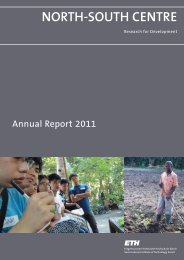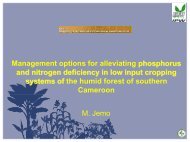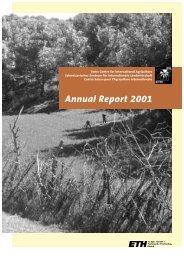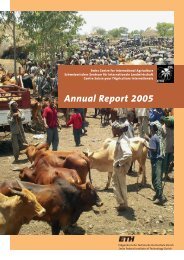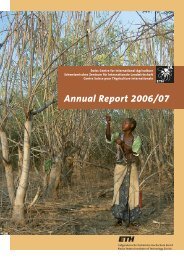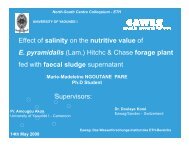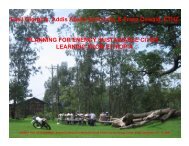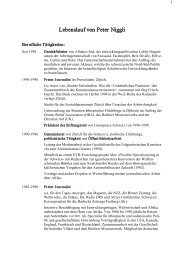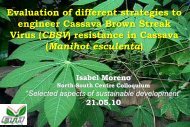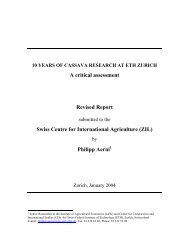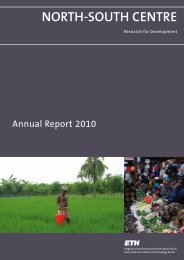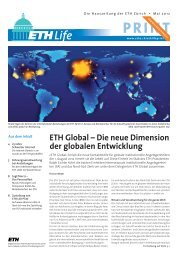NORTH-SOUTH CENTRE - ETH - North-South Centre North-South ...
NORTH-SOUTH CENTRE - ETH - North-South Centre North-South ...
NORTH-SOUTH CENTRE - ETH - North-South Centre North-South ...
Create successful ePaper yourself
Turn your PDF publications into a flip-book with our unique Google optimized e-Paper software.
means sacrificing certain career perspectives while still<br />
maintaining one’s personal career, then I think it is justified.<br />
However, sometimes one could also first focus on disciplinary<br />
qualifications and later expand into other fields such<br />
as R4D – a sequential approach. In my view, there is a tradeoff<br />
between pursuing a career in R4D and trying to get rapid<br />
achievements in one’s own professional career.<br />
Isabel Guenther: I am not so sure if there is always a tradeoff.<br />
I agree that first one should pursue the questions that<br />
one finds interesting and relevant. But, I think there are<br />
always cases where a certain research topic is more fashionable,<br />
resulting in impressive publication lists, while other<br />
topics do not bring the fastest rewards. However, this is<br />
nothing specific for R4D, but it is true for any discipline. I<br />
do not agree that one necessarily has to make a trade-off<br />
between R4D and a career in science.<br />
Bassirou Bonfoh: At the NCCR <strong>North</strong>-<strong>South</strong>, we are building<br />
the capacity of a new generation of scientists who are doing<br />
R4D. To get into R4D you have to prove that you have done<br />
basic research. Jumping directly into R4D is very difficult if<br />
you are not specialised before broadening your view by involving<br />
other disciplines or society in your research.<br />
Urs Wiesmann: Nevertheless, it is very interesting that at<br />
your university you try to include courses in transdisciplinarity<br />
and interdisciplinary methodology. Parallel to the<br />
disciplinary education, you can build a foundation for R4D.<br />
An additional important tension exists between conventional<br />
research and R4D. In conventional research, you get<br />
more famous the more general and the more generally applicable<br />
your result is. In contrast, R4D is then relevant when<br />
it is contextualised. The links between poverty and global<br />
market, or biodiversity and climate change appear in each<br />
context differently. The subsequent problems are different<br />
– related to different value systems and different stakes.<br />
Barbara Becker: In a way it comes back to what you said<br />
earlier about disciplinary research that has to be embedded<br />
in a larger programme in order to put it into perspective.<br />
For example, doctoral theses answer limited questions,<br />
leading to an academic degree. They usually consist of<br />
rather narrow disciplinary research not covering the<br />
entire continuum. In addition, doctoral theses in R4D are<br />
often highly demanding because they involve field research<br />
under very difficult conditions – compared to the lab situation<br />
at the university. This could be another trade-off. In<br />
addition, because our university environment or our research<br />
community does not award interdisciplinary<br />
research or impact generation – as has been said before –<br />
I wonder how one can influence this award system, the<br />
Isabel Guenther<br />
Isabel Guenther is Assistant Professor for Development<br />
Economics at the NADEL, <strong>ETH</strong> Zurich. She had previously been<br />
research associate at the Faculty of Development Economics<br />
of the University of Goettingen and at the Harvard School<br />
of Public Health. Her main research interest is in empirical<br />
microeconomics with a particular focus on measurement<br />
of poverty under uncertainty, health and population<br />
economics, economics of water and sanitation, and the<br />
effectiveness of development aid. Isabel Guenther has<br />
carried out most of her research in Mali, Benin, Burkina Faso,<br />
Ethiopia, and <strong>South</strong> Africa.<br />
See more information on NADEL on p. 90<br />
criteria by which you judge quality of research.<br />
Isabel Guenther: With regard to interdisciplinarity: Interdisciplinarity<br />
is not that somebody engages in various disciplines.<br />
But, you learn how to look at a problem from several<br />
perspectives, how to work and discuss with people from<br />
other disciplines, how to understand other disciplines and<br />
trying to take them into account. Barbara also mentioned<br />
the challenge of doing research involving fieldwork in developing<br />
countries, which is much more time-consuming than<br />
doing other kinds of research. I think that this is a problem if<br />
research is only measured in how many papers one is producing<br />
in the short-term. In my eyes, the quality of research is<br />
not only defined by how many papers one is writing.<br />
Bassirou Bonfoh: In our evaluation system, an African evaluation<br />
system of academics, we have different kind of indicators<br />
for evaluating the quality of research: The publications,<br />
the number of projects you can mobilise, and newly introduced<br />
“fiches techniques”, as we call them in French. If you<br />
want to transfer your research findings to the community<br />
or a single user, you can develop a leaflet that could be used<br />
for sensitisation or information of the research users. Such<br />
25<br />
FOCUS<br />
Research for development




